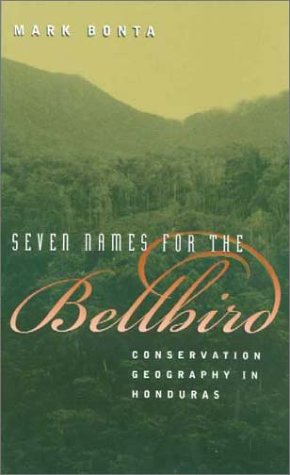
In the early 1990s, Mark Bonta was a Peace Corps volunteer in Honduras, and he has returned many times since, living and working in the province of Olancho
Seven Names for the Bellbird
Conservation Geography in Honduras
Mark Bonta
Offering intimate and unforgettable descriptions of the birds and people that inhabit Honduran landscapes, Seven Names for the Bellbird showcases the deep-rooted local traditions of bird appreciation and holds them up as a model for sound management of the environment. Through his recounting of local lore, author Mark Bonta makes the interaction between culture and avifauna in Latin America a key to better understanding the practice of biodiversity protection. He offers a significant contribution to the scarce anthropological and geographical literature on human-environment relationships in Central America and also provides stories of native birds and their human observers.
After a decade in the field in Honduras, Bonta came to realize that, contrary to outsiders’ general beliefs, the society he observed was predisposed "to like birds, to observe birds, to weave them into folklore, and to protect them on private property." Bonta argues that if North Americans and Europeans were to pay real attention to local knowledge and practice—instead of condemning them out-of-hand and imposing upon them new beliefs and techniques—they would learn that rural cultures offer alternative ways of accommodating habitats and wildlife.
Bonta uses the concept of "conservation geography"—the study of human beings and their landscapes, with natural resource conservation in the forefront—to advance his argument. He describes many cases in which local individuals and their traditional knowledge of birds contribute to a de facto variety of bird conservation that precedes or parallels "official" bird protection efforts.
This book is not offered as "proof" that all birds have happy futures in the Neotropics. Bonta recognizes the ravages of both human pressures and natural disasters on the birds and forests. But he shows that in many instances, birds are safe and even thrive in the presence of local people, who "celebrate them just as often as they persecute them."
MARK BONTA is an assistant professor of geography at Delta State University in Cleveland, Mississippi. In the early 1990s, he was a Peace Corps volunteer in Honduras, and he has returned many times since, living and working in the province of Olancho. He continues to participate in a wide variety of local environmental projects in Olancho, including the protection of the Sierra de Agalta National Park and the monitoring of the endemic tree cycad Dioon mejlae.
